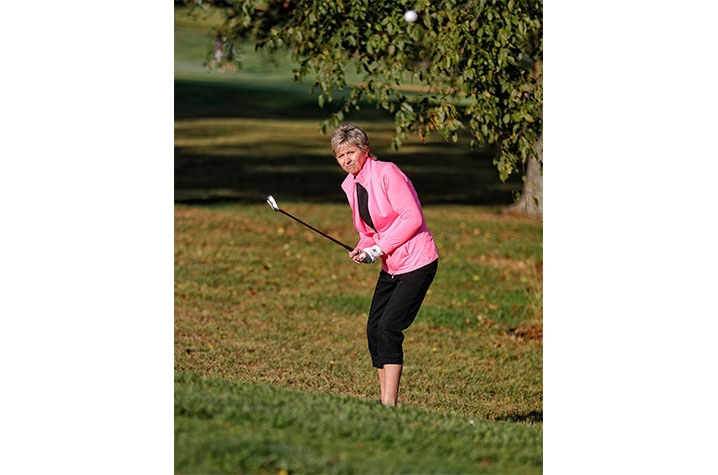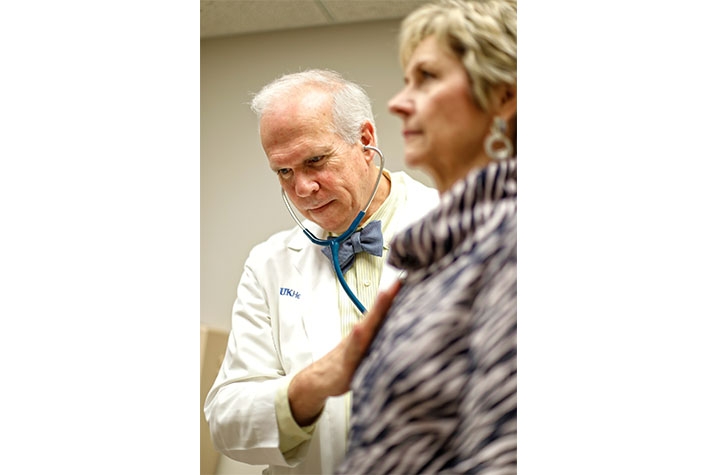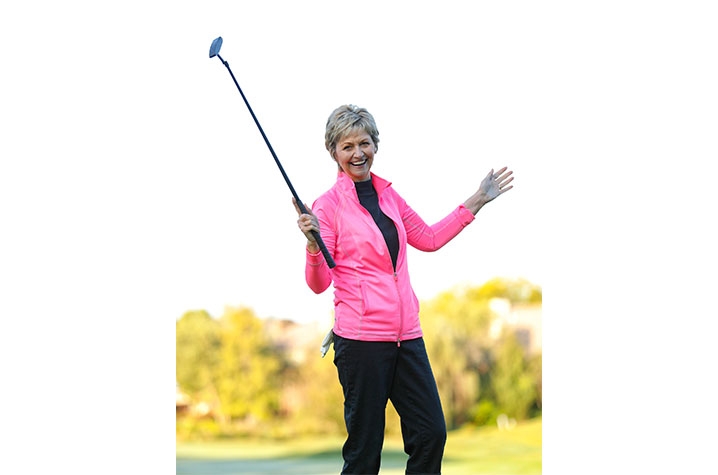Clinging to Life, Markey Patient Saved by Clinical Trial
LEXINGTON, Ky. (Nov. 22, 2016) – Serotonin is commonly known as the "feel-good" chemical, a neurotransmitter in the brain that plays a large role in elevating a person's mood.
But for 68-year-old Kentucky native Geri McDowell, it's the hormone that nearly took her life.
In 2003, McDowell pursued medical help out of state after experiencing a prolonged gastrointestinal illness that her local doctors couldn't explain. Her ultimate diagnosis: neuroendocrine cancer in her GI tract.
Neuroendocrine tumors are relatively rare, afflicting roughly 8,000 Americans a year. The neuroendocrine system comprises cells from both the nervous system and endocrine system, and this system regulates the physiological processes of the human body. Neuroendocrine tumors begin in the hormone-producing cells of this system, and they are frequently found in the lungs or GI tract.
McDowell underwent surgery to remove the mass. Afterward, she came home and life returned to normal – until five years later, when she her noticed unusual GI symptoms returning and sought medical advice again.
The cancer had recurred, this time with metastasis to her liver. She was sent back to Kentucky with instructions to find an oncologist who could help her manage her disease.
"They just told me, well, there's no treatment and no cure," she said. "The tumors I have in the liver, they're inoperable."
Back in Lexington, McDowell chose the University of Kentucky Markey Cancer Center for her care. At the time, Markey did not have an oncologist who specialized in neuroendocrine cancers. But when Dr. Lowell Anthony arrived in 2012, McDowell transferred into his care soon thereafter. With regular Sandostatin® injections, her tumors remained fairly stable and she maintained a normal life for a while.
However, neuroendocrine tumors are tricky: because of their origins, they often wreak havoc on a patient's hormones, leading to serious damage in other areas of the body. In McDowell's case, her tumors were producing too much serotonin.
"Serotonin in your brain is a good thing," Anthony said. "But too much serotonin in your body is not."
Though an increase in this chemical can help certain mood disorders, it causes major problems anywhere else in the body besides the brain. Excess serotonin in the body can cause a build-up of scar tissue in major organs, a fibrosis that Anthony describes as almost "wood-like."
Her body overloaded with serotonin, the tricuspid valve in McDowell's heart began to fail. She underwent open heart surgery to repair the valves at UK in August 2014, followed by the installation of a pacemaker and stent over the next few months in an effort to regulate her heart.
With her tumors continuing to overproduce the hormone, McDowell struggled to recover. The mitral valve in her heart also began to fail, requiring her to be on oxygen 24/7.
"I was in cardiac rehab to regain my strength, but I wasn't doing well at all," she said. "I'd lost so much weight, and I was so weak that I couldn't even stand."
In the meantime, Anthony doggedly searched for a clinical trial that suited McDowell, knowing that it was likely her best chance for survival. She finally qualified for one of his trials in early 2015, just as her health was reaching an all-time low.
"At one point during her ordeal, she was on her deathbed," Anthony said. "Her husband called in her pastor, friends and family. We were doing everything we could to keep her with us, to get her on that trial."
McDowell hung on, and began taking the trial medication. She slowly grew stronger over the following months, building up her stamina and gaining weight. Her shortness of breath began to dissipate, and she weaned herself off of the supplemental oxygen.
The trial medication worked, blocking the serotonin production in her tumors. But at a follow-up appointment with her cardiologist, Dr. David Booth, she received some better – even miraculous – news.
"My heart healed itself," she said. "Dr. Booth was telling me how well I was doing, and I said, 'Does the mitral valve usually repair itself?' and he said, 'No… except in your case.'"
More than a year after beginning the clinical trial, McDowell is feeling the strongest and healthiest she has in many years, something she attributes to both the trial and her strong support system of family, friends and church.
"Cancer isn't necessarily a death sentence, you know?" she said. "I just try to consider it a chronic condition, not a fatal condition. And I still have to pace myself. But my quality of life is amazing compared to what it was a year ago."
An avid golfer and a grandmother, McDowell's renewed energy is allowing her to once again do many things she had taken for granted, like hitting the links on a beautiful summer day, or taking a well-deserved cruise vacation.
"With the oxygen tank, I'd never felt so dependent in my life. I felt like a dog on a leash," she said. "But now I can do whatever I want to do. I want to play golf. I'm anxious to do that, and travel."
Anthony affectionately calls her his "zebra," noting that much like every zebra has its own distinctive striping, McDowell's extraordinary reaction to her treatment is also unique and special. Her case makes her a role model of sorts for other patients, particularly for those dealing with a brand-new diagnosis. She previously served as a support group coordinator at Markey, and Anthony recently asked her to come ease the fears of a patient who had been diagnosed with neuroendocrine cancer and traveled from another state to seek his expertise. While the term "clinical trial" can sound scary to someone who has never participated, McDowell is happy to dispel any myths surrounding trial participation and educate others on her experience.
"It's always scary to think about somebody asking you if you want to be on a clinical trial," she said. "But I trusted Dr. Anthony with anything, and when he thought it was the best thing, I said, 'Absolutely.' And even if it didn't help me, it might help someone else."
You can make a difference through participating in research and discovery. To find more information, including a list of current studies at UK and access to studies nationwide, you can visit UKclinicalresearch.com, call 859.257.7856, or join ResearchMatch.org.







